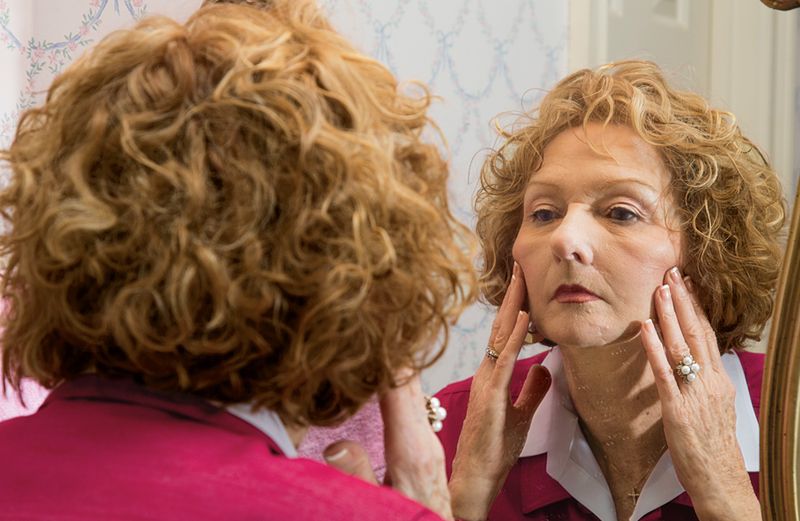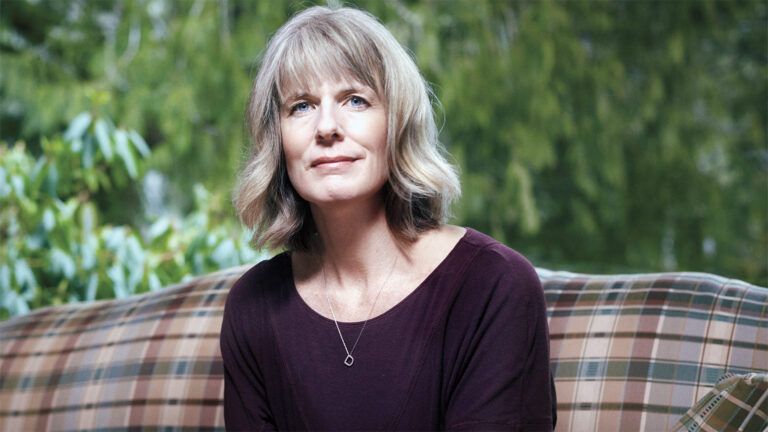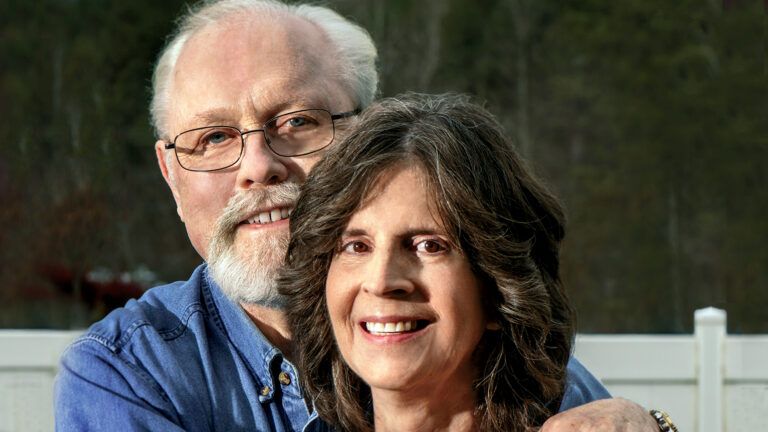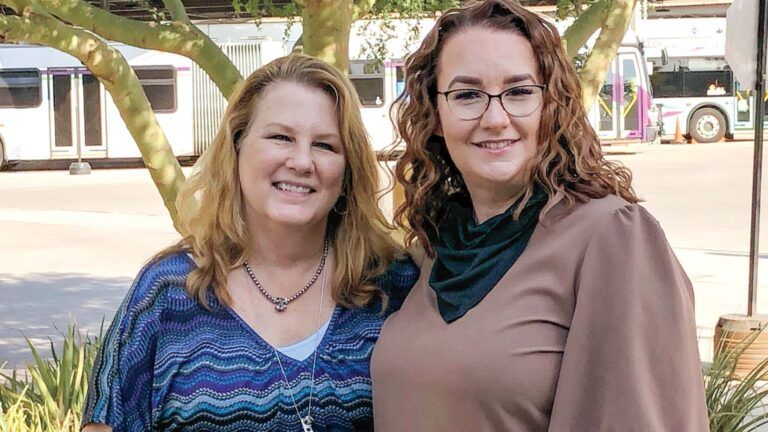I’d never really liked my face. My mouth was way too small, my nose not dainty enough. In my teens I complained to my mother about every facial flaw I thought I had, especially not having a cute little turned-up nose. She’d say, “Your face is lovely the way God made it.”
I’d even asked God to forgive me for being so vain. Yet now, in my seventies, I liked my face even less. Every time I looked in the mirror, I found something else I wanted to cover up. Another age spot. Another line. Another unwanted souvenir of the passage of time.
If I could have erased every sign of aging with makeup, I would have.
My dressing area was littered with all manner of lotions and potions promising to deliver something marvelous for my skin. The clutter drove my husband, Gene, crazy (he’s so neat and tidy our friends call him Mr. Clean), but he knew better than to ask me to get rid of my cosmetic arsenal.
I couldn’t imagine living without makeup. Lately I’d been toying with taking more drastic measures, having some surgical “refreshing” done like some of my friends. Sometimes I leaned close to the bathroom mirror and pulled my face back with my hands so everything looked firm and taut.
I had to admit, I liked it. Just for fun, I imagined waking up and a beaming plastic surgeon telling me, “You’re going to be very pleased, Marion.”
One day I was applying a new spray foundation, checking the mirror to make sure the color blended perfectly into my neck, when I noticed a tiny red bump near my chin. Now what? Yet another indignity of aging–senior pimples?
When it didn’t go away after two weeks, I went to my dermatologist, Dr. Maffei.
She kept a close watch on me anyway because my reddish hair, fair skin and freckles–like pale polka dots–put me at higher risk for skin cancer. I wore a good sunscreen and tried to avoid direct sunlight. Still, she’d had to remove a squamous cell carcinoma from my leg a few years back.
Dr. Maffei examined my skin carefully. First my face, then my body. She scrutinized the red bump on my chin. She also found something close to my nose, which somehow I’d missed. And there was a freckle on my upper left arm that didn’t look like the other freckles.
“I’ll biopsy these places on your face–probably basal cell carcinomas–and the one on your arm,” she said. “We’ll give you a call.” I knew basal cell carcinomas are the most common form of skin cancer and rarely spread, so I wasn’t concerned.
A few days later, Dr. Maffei’s assistant called. “We have your results back, Marion. The first one, on your arm, is a superficial melanoma.”
Regardless of the adjective before it, the word melanoma scared me so much I had to force myself to concentrate on what she said next.
“The ones on your face are basal cell cancers, as Dr. Maffei suspected. Let’s make an appointment for the superficial melanoma first.”
The next week Dr. Maffei removed the melanoma. She went to the lab to look at it under a microscope and came back to the exam room. “All margins are clear,” she said.
Whew. The worst was over.
I went back the following week to have the first of the skin cancers on my face taken care of, the red bump on my chin. Dr. Maffei explained that she would do Mohs surgery–remove one layer of skin at a time and examine the margins under a microscope for cancer cells.
If the margins were clear, the surgery would be over. If not, she’d repeat the procedure until the margins were clear.
I’d made my appointment for 10:00 a.m., expecting to be done well in time to have lunch with Gene. I ended up being at the dermatologist’s office for hours. Both Dr. Maffei and I were surprised.
The skin cancer turned out to be three layers deep, and there was a 45-minute wait between procedures while she biopsied the cells in the lab. Forty-five minutes for me to wait and wonder. To avoid worrying I napped.
Before she stitched me up, I asked, “The area where you removed the skin…is it large?”
“About the size of a half-dollar. Do you want to take a look?” She handed me a mirror.
I had to stifle a gasp. The wound on my chin looked enormous, like a sinkhole!
Finally, at two o’clock, Dr. Maffei was finished. I looked in the mirror again and tried to smile at my reflection. “My mouth doesn’t work,” I said. “It droops way down!” Only the left side smiled. The right seemed broken.
“That’s from the anesthetic I used to numb the area,” Dr. Maffei said. “Once it wears off, your mouth should return to normal.”
As soon as I got home, I called my daughters and told them the surgery had gone well, although my mouth wasn’t working properly. “But the doctor says it should return to normal in a little while.”
Both my daughters laughed. Even I had to. We all knew I’d never thought my mouth was normal.
The next time I saw Dr. Maffei, she removed the cancer close to my nose. Mohs surgery again, but it went a lot faster. When I got home, I couldn’t resist checking my face in the bathroom mirror. Because of the surgery I didn’t have makeup on. It was time for the unvarnished truth.
I stared at my face, the one God had given me, then leaned in close and studied my reflection. The fading reddish scar on my chin. The neat sutures by my nose. Reminders that the skin cancers were gone, that I was fortunate to have Dr. Maffei, her meticulous eye and her skilled hands.
The vertical creases between my brows…they were exactly like the ones my sweet mother developed in her later years, as though I carried a part of her with me. I examined my mouth. No drooping whatsoever. Still tiny, though.
And my unturned-up nose. I’d seen those same features in pictures of my father. He’d died when I was only two, before I had a chance to know him. Yet here was this indelible connection to him.
The stern lines around my mouth, those were from anguishing over my twin sons. At 15, they lost their father, my first husband, to brain cancer. Such a vulnerable age, when they needed a strong male role model.
As adults, my sons had experienced addictions, bipolar disorder, car wrecks, jail time. The important thing was, they’d survived. So had I. These were my survivor lines.
Ah, but I could see laugh lines too, around my eyes. From talking to my daughters, hearing about the crazy things my grandchildren came up with.
And there were what I call joy indentations. From Gene, the dear second husband God brought me 26 years ago.
The lines, the scars, the marks… they’d never seemed so beautiful to me. It wasn’t vanity that was my problem, it was insecurity. I’d thought my face needed to be a mask of perfection.
These days I think of my face as a map of my life. Its sorrows and joys. Pain and healing. Struggles and blessings, etched by God. And I’m grateful for what I see. So much that sometimes I don’t wear a dab of makeup at all.
Download your FREE ebook, Rediscover the Power of Positive Thinking, with Norman Vincent Peale.




